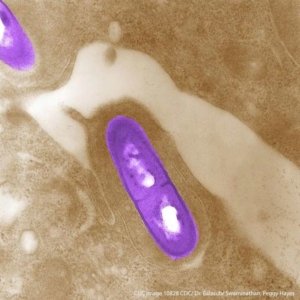What is Listeria Poisoning?
 Listeria poisoning is an infection of the body with Listeria bacteria, more specifically Listeria monocytogenes (or L. mono, for short). This kind of infection is called listeriosis.
Listeria poisoning is an infection of the body with Listeria bacteria, more specifically Listeria monocytogenes (or L. mono, for short). This kind of infection is called listeriosis.
The first signs of infection might include:
- Diarrhea
- Nausea
- Muscle aches
- Fever
The incubation period—the time between consumption of the contaminated food and first signs of illness—varies depending on the type of Listeria infection. Listeria illnesses can range from mild to “invasive.”
For otherwise healthy people, Listeria usually presents as a “stomach bug.” Mild infections are rarely diagnosed, because people may not even require medical care. In these circumstances, the incubation period is shorter: 24 hours, on average.
However, in people that are young, elderly, pregnant, or otherwise immunocompromised, a Listeria infection can be far more dangerous. Listeria can infect the nervous system (Listeria meningitis), the blood (bacteremia), joints, and, for pregnant women, cause harm to the developing baby.
Symptoms of invasive Listeria infections can include:
- Headache
- Stiff neck
- Confusion
- Loss of balance
- Convulsions
These are hallmark symptoms of meningitis. This type of Listeria infection has an average incubation period of 9 days, but it can vary from 1-14 days.
Pregnant women are at a greater risk for Listeria infections because their immune systems are weaker. Expectant moms are 20 times more likely to be infected with Listeria than the general population. However, pregnant women may not notice many symptoms themselves—potentially mild gastrointestinal symptoms—but the Listeria infection can be devastating for the baby. In early pregnancy, Listeria is known to cause miscarriage. Later in pregnancy, Listeria can cause preterm labor and even fetal death. Newborns infected with the disease may show signs of difficult breathing, fever, rash, jaundice, a poor appetite, and excessive sleepiness. For pregnant women, the incubation period is often longer, ranging from 17-67 days.
Listeria can be diagnosed by taking samples of spinal fluid, blood, placenta, or other bodily fluids. The sample is sent to a laboratory for a bacterial culture.
Listeria is widely regarded as one the deadliest foodborne pathogens, with about 20% of those infected dying from the illness. Those that suffer meningitis and survive can be left with long-term complications.
Put our food safety lawyers to work for you.
Call, email or text us – it’s absolutely free – and we’ll quickly be able to tell you if you have a case and explain the process of working with a lawyer and making a claim.
